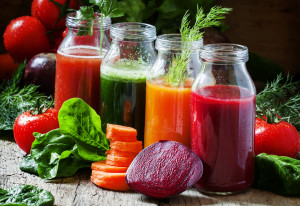The Truth About the Juice Diet Craze
 With fad diet and celebrity endorsers promising “get slim quick” benefits of all liquid and juice-based diets, it sounds too good to be true. Unfortunately for those counting down the weeks until their next bikini-necessary vacation, the juice diet trend may actually be TGTBT. All juice diet programs claim to offer such benefits as detoxification, weight-loss, and overall wellness, but research shows that such extreme diets may cause more harm than good.
With fad diet and celebrity endorsers promising “get slim quick” benefits of all liquid and juice-based diets, it sounds too good to be true. Unfortunately for those counting down the weeks until their next bikini-necessary vacation, the juice diet trend may actually be TGTBT. All juice diet programs claim to offer such benefits as detoxification, weight-loss, and overall wellness, but research shows that such extreme diets may cause more harm than good.
Typically, on an all juice diet, a person limits themselves to only fruit juices, water, and fresh vegetables for any length of time from a few days to a few weeks. On average, the diet may restrict a person’s calories to only 1,000 to 1,200 per day. If cutting calories is the recipe for losing weight, how can all juice diets not produce results, and what other dangers might they pose?
You may exercise less. When you consume fewer calories, you have less energy, leaving you without the stamina needed to get the recommended 30 minutes of exercise three to five days per week, which is needed for heart, lung, muscle, and mental health.
They won’t satisfy hunger cravings. Without the fiber present in whole fruits and vegetables, an all-juice diet won’t keep hunger at bay, which leaves many people tempted to break their diet by snaking on unhealthy foods, and sabotaging their weight-loss goals.
Despite popular claims, they are not substitutes for whole fruits and vegetables. Juicing removes many nutrients available in whole produce, and despite their claims, scientists have not been able to prove that juicing is healthier than consuming whole foods. You can also order juicers online and make sure you can make healthy choices everyday.
You may consume too many calories. It can be difficult to measure liquid calories. With the average juice beverage offering anywhere from 100 to 350 calories per 16-ounce serving, consuming too much juice could actually increase your overall calorie consumption and sabotage your weight-loss goals.
They deprive you of essential nutrients. By only consuming juices, you eliminate critical nutrients from your body, especially fiber, protein, and fat (yes, you need fat in your diet!)
You may experience side effects. Some liquid dieters report experiencing such side effects as dizziness, nausea, constipation, fatigue and irritability.
You don’t really need to “detox” your system. Your body is able to filter out unwanted substances on its own, which means there really isn’t a need to “cleanse” your system.
They can spike blood sugar levels. Without the fiber found in whole produce, your body will absorb fructose more readily, which can raise blood sugar to unsafe levels.
You may lower your metabolism. When your body doesn’t receive the amount of food it needs for a prolonged period of time, it will adjust by lowering your metabolism to accommodate for the difference – maybe permanently.
It may exposure you to dangerous pathogens. Most juice diets suggest consuming unpasteurized juice, which could increase the chances of exposure to pathogens.
It could deplete your muscles. Depending on your age, size, and weight loss goals, remaining on a diet that is too calorically restrictive may result in your body using muscle tissue instead of fat for energy.
It’s not a proven cure for diseases. While some cleanses claim such miracle benefits as curing cancer, the reality is that no scientific evidence exists that proves an all-liquid diet can cure cancer or other diseases.
It is not a long-term diet solution. Will you lose weight by drastically reducing your calories for a period of time? Most likely yes, but what happens when you revert back to a non-all-juice diet? It is not feasible to remain on an all-liquid meal plan indefinitely, and when you revert back to eating higher calorie foods, you will likely gain back some of the weight you lost.
It can be dangerous for those with compromised immune systems. All juice diets are not healthy options for those women undergoing chemotherapy, diabetics, people with nutritional deficiencies, and people with kidney disease due to the high levels of sugar and potassium in most juices.
Instead of attempting a long-term fad diet, speak with your doctor about healthy ways to lose weight. He/she can help you to devise a weight-loss plan that suits your health goals and your lifestyle. And if you are looking for a new OB-Gyn and are in the Western New York area, we are accepting new patients.
More